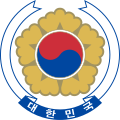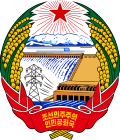Korea and the United Nations
 From Wikipedia - Reading time: 15 min
From Wikipedia - Reading time: 15 min
  | |
| United Nations membership | |
|---|---|
| Membership | Full member |
| Since | 17 September 1991 |
| UNSC seat | Non-permanent |
| Permanent Representative | Hwang Joon-kook |
  | |
| United Nations membership | |
|---|---|
| Membership | Full member |
| Since | 17 September 1991 |
| UNSC seat | Non-permanent (never elected) |
| Permanent Representative | Kim Song |
| Part of a series on |
| North Korea and the United Nations |
|---|
  |
The Republic of Korea (commonly known as South Korea) and the Democratic People's Republic of Korea (commonly known as North Korea) were simultaneously admitted to the United Nations (UN) in 1991. On 8 August 1991, the UN Security Council passed Resolution 702, recommending both states to the General Assembly for membership. On 17 September 1991, the General Assembly admitted both countries under Resolution 46/1.
History
[edit]Observers (1948–1991)
[edit]On 12 December 1948, the Republic of Korea was officially recognized by the UN General Assembly (UNGA) under Resolution 195.[1][a] From that point, South Korea participated in the GA as an observer.
Both South Korea and North Korea applied for membership in the UN in 1949, but no action was taken on their applications at that time as the Soviet Union opposed the admission of South Korea.[2]
In June 1950, North Korea invaded South Korea, and the Korean War commenced. The UN Security Council denounced the invasion, and "recommended that Members of the United Nations furnish such assistance to the Republic of Korea as may be necessary to repel the armed attack and to restore international peace and security in the area," and "that all Members providing military forces and other assistance...make such forces and other assistance available to a unified command under the United States of America," and authorized this new United Nations Command "at its discretion to use the United Nations flag in the course of operations against North Korean forces..."[3] Sixteen nations responded by sending combat troops (and five other countries sent humanitarian aid) to support South Korea. The Soviet Union, a veto-wielding power, was absent and failed to prevent the UN resolution,[4] having been boycotting proceedings since January 1950 in protest that the Republic of China and not the People's Republic of China held a permanent seat on the council.[5] The Council President at the time was Norwegian Arne Sunde.[6]
Coming with change of recognition in 1971 of the Chinese seat, North Korea also gained observer status in 1973.[2]
As the Cold War came to a close, South Korea announced in 1991 that it would seek its own membership in the UN.[7] North Korea had previously opposed separate membership in the UN for itself and South Korea because it opposed the permanent recognition of "two Koreas".[7] However, with no prospect of a Chinese or Soviet veto of South Korea's bid, North Korea announced that it would also seek UN membership, stating that North Korea "has no alternative but to enter the United Nations at the present stage" to avoid having "important issues related to the interests of the entire Korean nation [being] dealt with in a biased manner on the U.N. rostrum."[7] South Korea's Foreign Ministry welcomed North Korea's application, saying that separate memberships for the two Koreas would "greatly contribute to easing tension ... and also facilitate the process of peaceful reunification."[7] The UN Security Council unanimously recommended both North Korea and South Korea for membership, with the two countries being admitted on 17 September 1991.[2]
North Korea and the UN (1991–present)
[edit]North Korea has never held a seat on the UN Security Council.[8] It has a Permanent Mission to the UN in New York City, and additionally maintains a mission to the UN in Paris and an Ambassador to the UN at the UN Office at Geneva.[9][10]
As of 2018, since 2005, the UNGA has adopted a resolution every year to condemn the human rights situation in North Korea.[11]
In December 2019, US Ambassador to the United Nations Kelly Craft said during a meeting of the UN Security Council (which was called at her request) that the US was prepared to take "simultaneous steps" with North Korea to achieve peace.[12][13] But she also warned the North Koreans against conducting further missile tests.[12][13]
South Korea and the UN (1991–present)
[edit]South Korea has been a vigorous participant in the UN meetings, assemblies, and higher level meetings.[14][15]
South Korea has thrice been elected to a non-permanent seat of the UN Security Council, first in the 1995 election for 1996–97 and again in the 2012 election for 2013–14, and most recently, in the 2022, for 2023-2024.[16][17][18][19]
In 2001, Han Seung-soo of South Korea held the presidency of the UNGA.[20] In 2006, Ban Ki-moon from South Korea was elected as the Secretary-General of the United Nations. He was re-elected in 2011.[21][22]
See also
[edit]Notes
[edit]- ^ The recognition was refused by Soviet Union and other communist states at the first time.[citation needed]
References
[edit]- ^ "ODS HOME PAGE" (PDF). documents-dds-ny.un.org.
- ^ a b c King, Robert (24 September 2021). "The Two Koreas Mark 30 Years of UN Membership: The Road to Membership". KEIA.org. Retrieved 2 July 2022.
- ^ "Resolution 84: Complaint of aggression upon the Republic of Korea". United Nations. Retrieved 9 March 2020.
- ^ "Strength on Double Seven". Time Magazine. 17 July 1950. Archived from the original on 31 January 2011. Retrieved 16 November 2008.
- ^ Malkasian, Carter (2001). The Korean War: Essential Histories. Osprey Publishing. p. 16.
- ^ "Strength on Double Seven". Time Magazine. 17 July 1950. Archived from the original on 31 January 2011. Retrieved 16 November 2008.
- ^ a b c d Reid, T.R. (29 May 1991). "N. Korea Seeks Separate U.N. Membership". The Washington Post. Retrieved 2 July 2022.
- ^ "Countries Never Elected Members of the Security Council". United Nations. Retrieved 4 October 2016.
- ^ "Countries that have established diplomatic relations with the DPRK". North Korea in the World. East-West Center, The National Committee on North Korea. Retrieved 16 December 2020.
- ^ Nebehay, Stephanie (22 May 2019). "North Korea Says 'Biggest Issue' in U.S. Ties Is Impounded Ship". Reuters. Retrieved 7 December 2020.
- ^ "Resolution on N. Korea's human rights violations presented to U.N. committee". Archived from the original on 3 February 2018. Retrieved 3 June 2021.
- ^ a b "Remarks at a UN Security Council Briefing on Nonproliferation and the DPRK". United States Mission to the United Nations. 11 December 2019.
- ^ a b Gladstone, Rick (12 December 2019). "After North Korea Hints at New Policy, U.S. Warns Against More Missile Tests; The American ambassador to the United Nations, responding to North Korean signals that it could resume long-range missile tests, said such a move would be 'deeply counterproductive.'". The New York Times.
- ^ "Korea's Participation in UN ActivitiesPermanent Mission of the Republic of Korea to the United Nations". overseas.mofa.go.kr. Retrieved 19 May 2024.
- ^ Korea, Ministry of Foreign Affairs, Republic of. "Overview | UN Ministry of Foreign Affairs, Republic of Korea". www.mofa.go.kr (in Korean). Retrieved 19 May 2024.
{{cite web}}: CS1 maint: multiple names: authors list (link) - ^ "ASSEMBLY ELECTS CHILE, EGYPT, GUINEA-BISSAU, POLAND, REPUBLIC OF KOREA TO TWO-YEAR TERMS ON SECURITY COUNCIL | Meetings Coverage and Press Releases". www.un.org.
- ^ "Argentina, Australia, Luxembourg, Republic of Korea and Rwanda obtain non-permanent seats on UN Security Council". UN News. 18 October 2012.
- ^ "Seoul Stepping Up: South Korea as a Non-Permanent UN Security Council Member". www.cnas.org. Retrieved 19 May 2024.
- ^ Seung-yeon, Kim (1 January 2024). "S. Korea vows responsibility as elected UNSC member as 2-year term begins". Yonhap News Agency. Retrieved 19 May 2024.
- ^ "HAN SEUNG-SOO OF REPUBLIC OF KOREA ELECTED PRESIDENT OF FIFTY-SIXTH GENERAL ASSEMBLY SESSION | Meetings Coverage and Press Releases". www.un.org.
- ^ "Ban Ki-moon". United Nations Secretary-General. 28 November 2016.
- ^ "Ban Ki-moon appointed next UN Secretary-General by acclamation". UN News. 13 October 2006.
Further reading
[edit]- Chi Young Pak (2000). Korea and the United Nations. The Hague: Martinus Nijhoff Publishers. ISBN 978-90-411-1382-5.
- Jonsson, Gabriel (2017). South Korea in the United Nations: Global Governance, Inter-Korean Relations and Peace Building. World Scientific. ISBN 978-1-78634-193-8.
- Kŭktong Munje Yŏn'guso (1973). North Korea's Policy Toward the United Nations. Institute for East Asian Studies.
 KSF
KSF

